

Data Mining Reveals the Six Basic Emotional Arcs of Storytelling. Back in 1995, Kurt Vonnegut gave a lecture in which he described his theory about the shapes of stories.
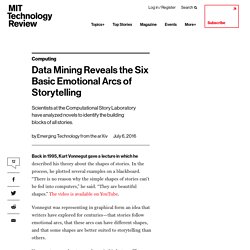
In the process, he plotted several examples on a blackboard. “There is no reason why the simple shapes of stories can’t be fed into computers,” he said. “They are beautiful shapes.” The video is available on YouTube. Vonnegut was representing in graphical form an idea that writers have explored for centuries—that stories follow emotional arcs, that these arcs can have different shapes, and that some shapes are better suited to storytelling than others. Vonnegut mapped out several arcs in his lecture. Vonnegut is not alone in attempting to categorize stories into types, although he was probably the first to do it in graphical form.
However, there is little agreement on the number of different emotional arcs that arise in stories or their shape. Their method is straightforward. The results make for interesting reading. The six basic emotional arcs are these: 11 Books TED Speakers Say You Must Read. Future Wise: Educating Our Children for a Changing World: David Perkins: 9781118844083: Amazon.com: Books. You Cannot Afford to Miss These Free Resources for Audio Books, eBooks and Textbooks. About ETR Community EdTechReview (ETR) is a community of and for everyone involved in education technology to connect and collaborate both online and offline to discover, learn, utilize and share about the best ways technology can improve learning, teaching, and leading in the 21st century.
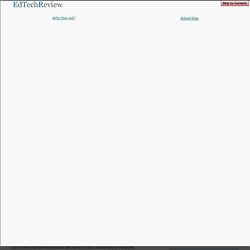
2014’s Best Books on Psychology, Philosophy, and How to Live Meaningfully. The Reading Brain in the Digital Age: The Science of Paper versus Screens. In a viral YouTube video from October 2011 a one-year-old girl sweeps her fingers across an iPad's touchscreen, shuffling groups of icons.
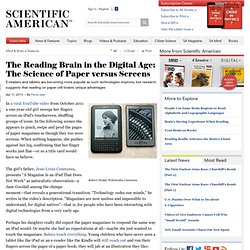
In the following scenes she appears to pinch, swipe and prod the pages of paper magazines as though they too were screens. When nothing happens, she pushes against her leg, confirming that her finger works just fine—or so a title card would have us believe. The girl's father, Jean-Louis Constanza, presents "A Magazine Is an iPad That Does Not Work" as naturalistic observation—a Jane Goodall among the chimps moment—that reveals a generational transition. "Technology codes our minds," he writes in the video's description. "Magazines are now useless and impossible to understand, for digital natives"—that is, for people who have been interacting with digital technologies from a very early age. Perhaps his daughter really did expect the paper magazines to respond the same way an iPad would. Kurt Vonnegut’s 8 Tips on How to Write a Great Story.
By Maria Popova The year of reading more and writing better is well underway with writing advice the likes of David Ogilvy’s 10 no-bullshit tips, Henry Miller’s 11 commandments, Jack Kerouac’s 30 beliefs and techniques, John Steinbeck’s 6 pointers, and various invaluable insight from other great writers.
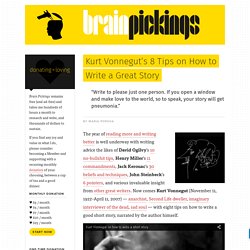
Now comes Kurt Vonnegut (November 11, 1922–April 11, 2007) — anarchist, Second Life dweller, imaginary interviewer of the dead, sad soul — with eight tips on how to write a good short story, narrated by the author himself. Use the time of a total stranger in such a way that he or she will not feel the time was wasted.Give the reader at least one character he or she can root for.Every character should want something, even if it is only a glass of water.Every sentence must do one of two things — reveal character or advance the action.Start as close to the end as possible.Be a Sadist. 500 Free eBooks: Download to Kindle, iPad/iPhone & Nook. Download 800 free eBooks to your Kindle, iPad/iPhone, computer, smart phone or ereader.
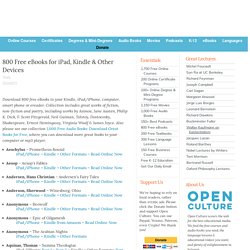
Collection includes great works of fiction, non-fiction and poetry, including works by Asimov, Jane Austen, Philip K. Dick, F. Scott Fitzgerald, Neil Gaiman, Tolstoy, Dostoevsky, Shakespeare, Ernest Hemingway, Virginia Woolf & James Joyce. Also please see our collection 1,000 Free Audio Books: Download Great Books for Free, where you can download more great books to your computer or mp3 player. Learn how to load ebook (.mobi) files to your Kindle with this video Religious Texts Assorted Texts. 160 Free Textbooks: A Meta Collection. Free textbooks (aka open textbooks) written by knowledgable scholars are a relatively new phenomenon.
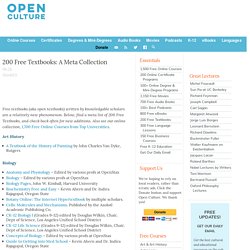
Below, find a meta list of 200 Free Textbooks, and check back often for new additions. Also see our online collection, 1,700 Free Online Courses from Top Universities. Art History A Textbook of the History of Painting by John Charles Van Dyke, Rutgers Biology. The Best Places To Find Your Next Free Book Online - io9. The 100 Greatest Science Fiction & Fantasy Novels Of All Time. John harris The 100 Greatest SFF Novels of All Time.
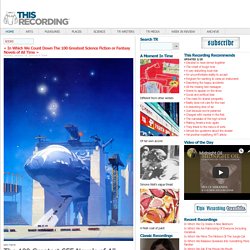
Science Fiction - A Nerd’s Guide to Reading. Top 10 Underrated Fantasy Stories Before 1937. Books J.R.R.
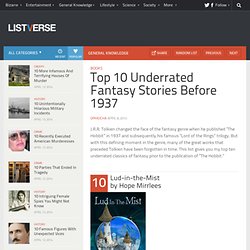
Tolkien changed the face of the fantasy genre when he published “The Hobbit” in 1937 and subsequently his famous “Lord of the Rings” trilogy. But with this defining moment in the genre, many of the great works that preceded Tolkien have been forgotten in time. This list gives you my top ten underrated classics of fantasy prior to the publication of “The Hobbit.” Sci-Fi Lists - Top 100 Sci-Fi Books. Lifelong Learner: 100 Essential Books. What Should I Read Next? Science Fiction - A Nerd’s Guide to Reading. The 50 Books Everyone Needs to Read, 1963-2013.
The thing about reading is this: it takes a long time.
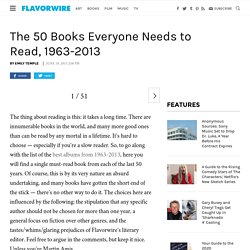
There are innumerable books in the world, and many more good ones than can be read by any mortal in a lifetime. It’s hard to choose — especially if you’re a slow reader. So, to go along with the list of the best albums from 1963-2013, here you will find a single must-read book from each of the last 50 years. Of course, this is by its very nature an absurd undertaking, and many books have gotten the short end of the stick — there’s no other way to do it. The choices here are influenced by the following: the stipulation that any specific author should not be chosen for more than one year, a general focus on fiction over other genres, and the tastes/whims/glaring prejudices of Flavorwire’s literary editor. What should I read next.